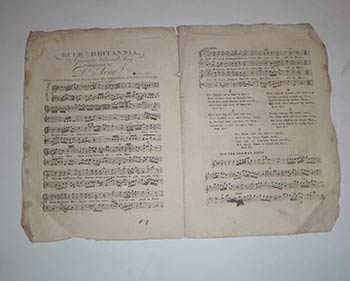
Rule, Britannia! A favorite National Song. Composed by Dr. Arne. Price 1s. Original engraved sheet music.
London: Robinson & Son, Musicians and Music Publishers, 3, Wilson St., Finsbury. Sq. , circa earlty 19th Century. 4 pages, engraved on 2 sides. 14 x 10 inches.
Expertise by Thierry BODIN - 01 45 48 25 31
Syndicat Français des experts Professionnels en Oeuvre d'Art
Historic UK:
The patriotic song ‘Rule, Britannia!, Britannia rule the waves’, is traditionally performed at the ‘Last Night of the Proms’ which takes place each year at the Royal Albert Hall.
Originally, Great Britain was called ‘Albion’ by the Romans, who invaded Britain in 55BC, but this later became ‘Britannia’. This Latin word referred to England and Wales, but was no longer used for a long time after the Romans left.
BritanniaThe name was then revived in the age of the Empire, when it had more significance. The word ‘Britannia’ is derived from ‘Pretannia’, from the term that the Greek historian Diodorus Siculus (1BC) used for the Pretani people, who the Greeks believed lived in Britain. Those living in Britannia would be referred to as Britanni.
The Romans created a goddess of Britannia, wearing a Centurion helmet and toga, with her right breast exposed. In the Victorian period, when the British Empire was rapidly expanding, this was altered to include her brandishing a trident and a shield with the British flag on, a perfect patriotic representation of the nation’s militarism. She was also standing in the water, often with a lion (England’s national animal), representing the nation’s oceanic dominance. The Victorians were also too prudish to leave her breast uncovered, and modestly covered it to protect her dignity!
The ‘Rule, Britannia!’ song that we recognise today started out as a poem co-written by the Scottish pre-Romantic poet and playwright, James Thomson (1700-48), and David Mallet (1703-1765), originally Malloch. He was also a Scottish poet, but was less well-known than Thomson. The English composer, Thomas Augustine Arne (1710-1778), then composed the music, originally for the masque ‘Alfred’, about Alfred the Great. Masques were a popular form of entertainment in 16th and 17th century England, involving verse, and, unsurprisingly, masks! The first performance of this masque was on 1st August, 1740, at Cliveden House, Maidenhead. Item #16-3930
Price: $250.00
